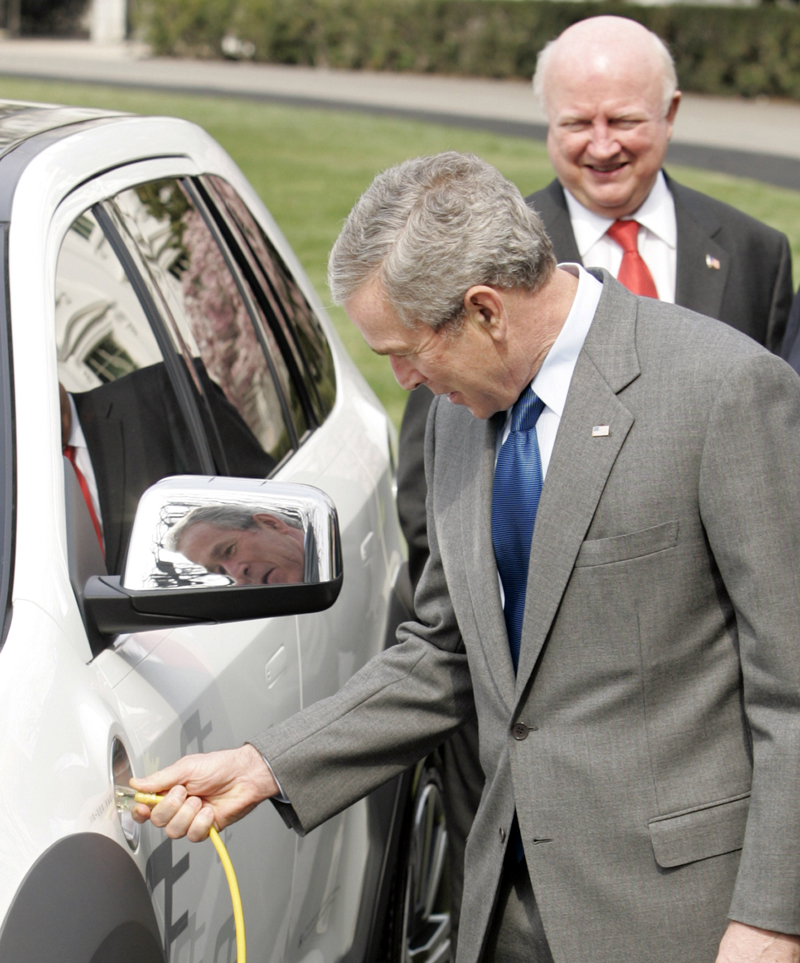Bush extols alternative fuel vehicles

President Bush plugs a power cord into a Ford vehicle on Monday during a demonstration on the South Lawn of the White House, with Energy Secretary Samuel Bodman in the background. Bush highlighted alternative fuel vehicles as a way to reduce reliance on imported oil.
Washington ? President Bush touted the benefits of “flexible fuel” vehicles running on ethanol and biodiesel on Monday, meeting with automakers to boost support for his energy plans.
Bush said a commitment by the leaders of the domestic auto industry to double their production of flex-fuel vehicles could help motorists shift away from gasoline and reduce the nation’s reliance on imported oil.
“That’s a major technological breakthrough for the country,” Bush said after inspecting three alternative vehicles. If the nation wants to reduce gasoline use, he said “the consumer has got to be in a position to make a rational choice.”
The president urged Congress to “move expeditiously” on legislation the administration recently proposed to require the use of 35 billion gallons of alternative fuels by 2017 and seek higher fuel economy standards for automobiles.
Executive discussions
Bush met with General Motors Corp. chairman and chief executive Rick Wagoner, Ford Motor Co. chief executive Alan Mulally – who grew up in Lawrence and graduated from Lawrence High School and Kansas University – and DaimlerChrysler AG’s Chrysler Group chief executive Tom LaSorda.
They discussed support for flex-fuel vehicles, attempts to develop ethanol from alternative sources like switchgrass and wood chips and the administration’s proposal to reduce gas consumption by 20 percent in 10 years.
The discussions came amid rising gasoline prices. The latest Lundberg Survey found the nationwide average for gasoline has risen 6 cents per gallon in the past two weeks to $2.61.
Energy issues
Wagoner said they spent “very little time” discussing gas mileage standards beyond the president’s support for reforming how standards are applied for passenger cars.
Bush welcomed the CEOs to the Oval Office for the second time in the past five months. While the November meeting was broad in its scope – with discussions on trade, health care and energy policies – Monday’s gathering was focused exclusively on energy issues.
The president generated criticism in Michigan when he told The Wall Street Journal in January 2006 that the automakers need to build “a product that’s relevant.” But standing with the executives on Monday, Bush said they “recognize the reality of the world in which we live” and are exploring new technologies.
The Detroit-based automakers said they have about 6 million of the vehicles on the road and reiterated their commitment to double their production of flexible fuel vehicles to about 2 million a year by 2010.
“We think this is the answer for America to lower our dependence on foreign oil,” LaSorda said.
Automakers said they could make half their cars and trucks capable of running on alternative fuels by 2012 if enough E85, an ethanol blend of 85 percent ethanol and 15 percent gasoline, is available.
Flex-fuel criticisms
The industry leaders said the government must help make E85 more available to consumers, noting that less than 1 percent of the nation’s gas stations offer the ethanol blend.
Many environmental and consumer groups said the focus on ethanol undermines attempts to push automakers to make cars more fuel efficient. They noted that few flex-fuel vehicles actually use E85 and auto manufacturers receive a credit on federal fuel-economy requirements by producing the vehicles.
“Automakers fool consumers into thinking they are helping the environment and lessening our dependency on foreign oil, while they manipulate the CAFE credit loophole, avoid meeting federal fuel economy standards and laugh their way to the bank,” said Joan Claybrook, president of Public Citizen.
Bush checked out some flex-fuel vehicles on the South Lawn following the meeting: GM’s flex-fuel Chevrolet Impala running on E85; Ford’s Edge HySeries with a plug-in hydrogen fuel cell; and DaimlerChrysler’s Jeep Grand Cherokee diesel filled with B5, a biodiesel blend.
Mulally said a mix of alternative vehicles – hybrids, hydrogen fuel cells and plug-ins – “give us some great options to satisfy our need for flexibility as well as being good stewards of the environment.”







